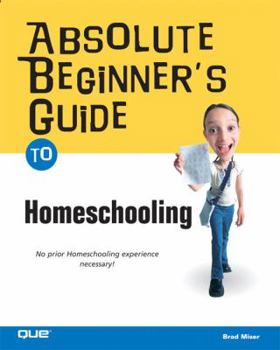Absolute Beginner's Guide to Home Schooling
Who knew how simple Homeschooling could be? Tens of millions of parents like you have decided that the best way to prepare their children for life is by educating them at home instead of at a... This description may be from another edition of this product.
Format:Paperback
Language:English
ISBN:0789732777
ISBN13:9780789732774
Release Date:September 2004
Publisher:Que
Length:336 Pages
Weight:1.25 lbs.
Dimensions:0.8" x 7.4" x 9.2"
Customer Reviews
1 rating
A good starting point for learning about homeschooling
Published by Thriftbooks.com User , 19 years ago
This is a good starting point for someone interested in homeschooling. It covers many of the reasons for homeschooling, walks the reader though the steps on how to find out what they have to do legally to homeschool, explains how to organize to do an effective job of homeschooling, shows how to manage a homeschool, and includes a list of resources to help the reader find other useful books and places to improve their homeschool. For the last couple decades public schools have gotten worse and worse. "A Nation at Risk," which was published in 1984, made public the growing concern about the decline of public education. Thomas Sowell's "Inside American Education" explores some of the reasons for the decline. Diane Ravitch's "Left Back: A Century of Battles of School Reform" puts the decline in a historical perspective. So one of the main reasons for the dramatic growth of homeschooling is the recognition that in many cases public schools are not teaching children how to read, write, or do arithmetic. A large percentage of children are dropping out of high school and another large percentage graduate, but are functionally illiterate. Over the last thirty years the homeschooling movement has grown to encompass every facet of society in the United States. It has been growing around 7% to 10% a year. Initially the homeschooling movement started with a couple small groups of people, largely hippies and Christians. Both of these groups were very distrustful of public schools and the effects government controlled public schools were having on their children. Now there are black homeschoolers, pagan homeschoolers, unschoolers, and so on. Brad Miser's book does a good job of addressing many of the basics of homeschooling. His main focus is on those who chose to have a structured homeschooling experience. As such he doesn't address homeschoolers who are not structured and let the children make decisions about what they (the children) want to learn. For me the biggest weakness of the book was not exploring the full range of options for parents who are thinking about homeschooling. In the chapter on socialization there are many good reasons to keep children out of public schools as it explores the positive types of socialization homeschoolers can have, and the negative types of socialization children are forced into in the public schools. Most homeschooled children have a wider range of friends, than children in public schools who only hang out with children their own age. There are several chapters on how to prepare to homeschool. One whole chapter covers why it is important to network, and ways to find other homeschoolers. There is a chapter on how to plan out a school year and where get the resources. There are several chapters on how to manage a homeschool. The author talks about how to have very structured classes. He encourages parents to have a lot of documentation on what the children are doing. I liked the chapter on taki






